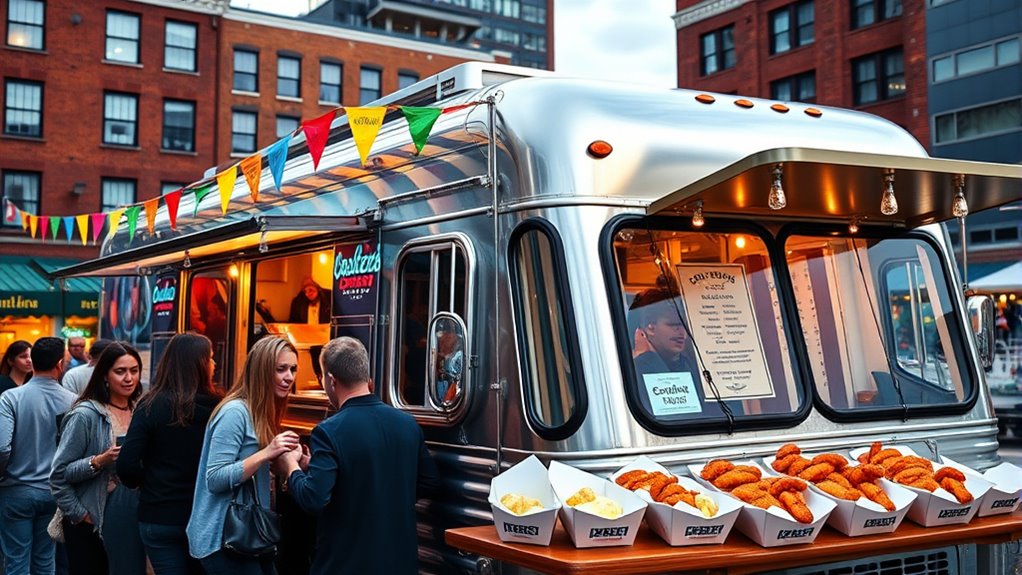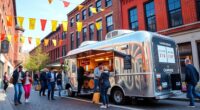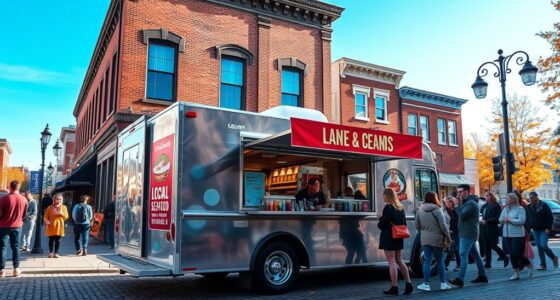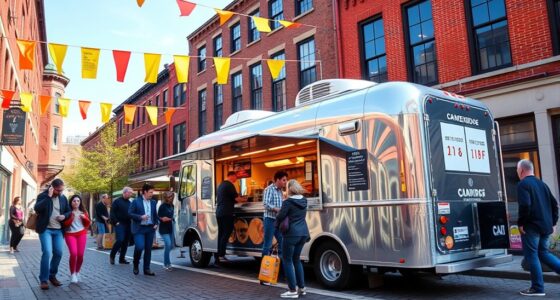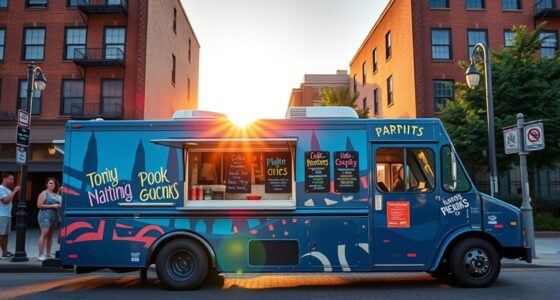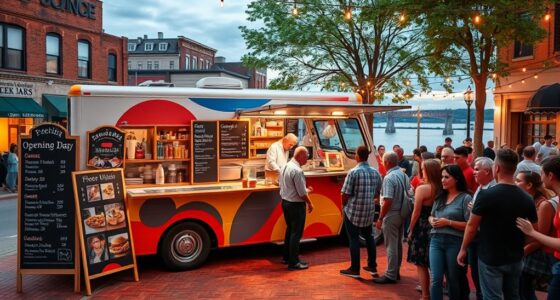To open a food truck in Boston, you’ll need permits like a food truck permit ($500/year), health and fire permits, and a Hawker license, with costs totaling around $17,000 annually. Focus on high-traffic spots, such as downtown or event venues, and create a menu with late-night options and local favorites. Effective marketing with social media and visual branding helps attract customers. Keep compliance in check to guarantee long-term success; gather all these details to get started confidently.
Key Takeaways
- Obtain essential permits including Boston Food Truck Permit, Health Permit, Fire Permit, and a Hawker and Peddler License, with costs around $17,000 annually.
- Startup costs range from $10,000 to $30,000, covering vehicle, equipment, permits, and initial supplies.
- Focus on high foot traffic locations like downtown, parks, and transit hubs, especially during peak hours and local events.
- Develop a diverse menu with late-night options, fusion dishes, and vegetarian options, and leverage social media for marketing.
- Ensure ongoing compliance by maintaining permits, safety standards, and inspection records to avoid fines and operational disruptions.
Navigating Boston’s Permit and Licensing Process
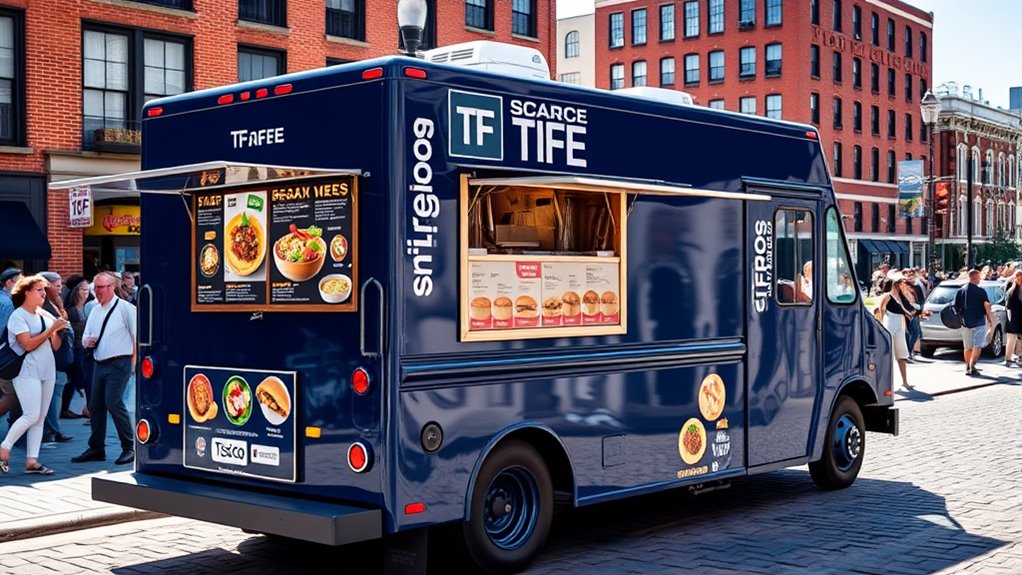
Understanding Boston’s permit and licensing process can seem complex, but understanding the key requirements makes it manageable. First, you’ll need a Food Truck Permit from the city, which requires submitting documents and paying a $500 annual fee. You must also obtain a Health Permit from Boston Inspectional Services, passing health inspections based on state and FDA food codes, with a $100 fee. A Fire Permit is necessary to verify fire suppression systems and extinguishers. Additionally, you’ll need a Hawker and Peddler License from Massachusetts, plus a Business Certificate if operating under a different name, costing $50. Securing a commissary agreement is essential for food prep and storage, with trucks reporting there twice daily. You’ll also need approval for vending locations, proof of restroom access, and to complete multiple inspections before approval. Incorporating regulations related to food safety and storage ensures compliance and smooth operation of your food truck business.
Estimating Startup and Operational Expenses
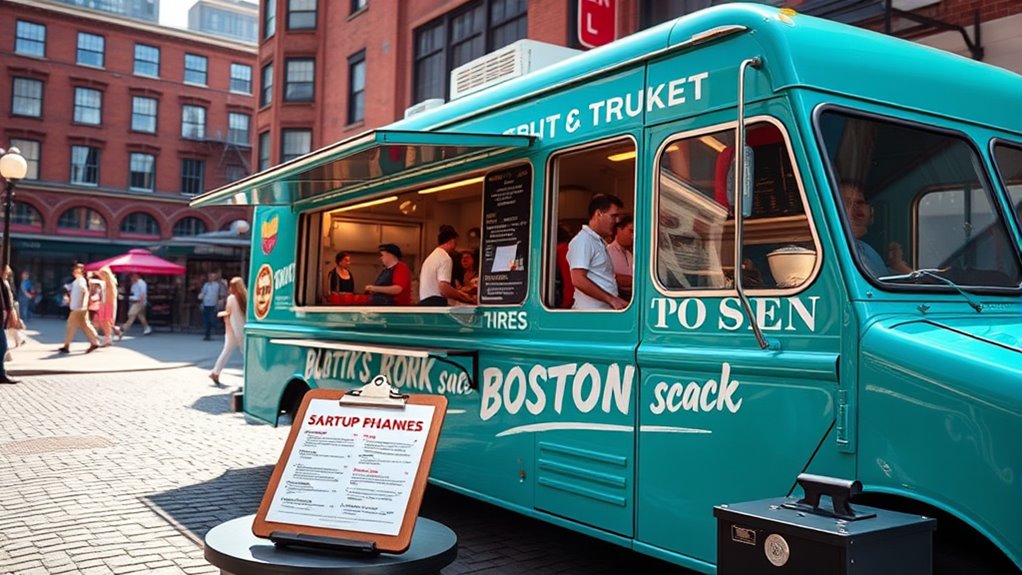
Understanding your startup and operational expenses is essential for launching your food truck in Boston. You’ll need the initial investment for vehicle, equipment, permits, and supplies, along with ongoing costs like permits, insurance, and maintenance. Planning these expenses carefully helps ensure your business stays financially sustainable from the start. Being aware of local permit fees and regulations is crucial, as Boston’s licensing requirements and costs can significantly impact your budget and timeline. Additionally, familiarizing yourself with local licensing authorities can streamline the approval process and help you avoid unexpected delays.
Initial Investment Breakdown
Launching a food truck in Boston requires a careful estimate of both startup and ongoing expenses. Your initial investment will include vehicle costs, permits, equipment, inventory, and marketing.
- Vehicle purchase: New trucks range from $75,000 to $200,000, while used trucks cost $50,000 to $100,000. Costs vary based on customization, size, build specifications, and builder choice.
- Permits and licenses: Expect to spend around $17,000 annually, covering health, safety, and zoning.
- Equipment and setup: Kitchen equipment costs $2,000–$3,000, with additional expenses for propane tanks, generators, and signage.
- Initial supplies: Budget $1,000–$2,000 for ingredients, packaging, and disposables, plus $500–$1,000 for vehicle fuel and maintenance in the first months.
These upfront costs form the foundation for your successful food truck venture in Boston.
Ongoing Operating Expenses
Estimating ongoing operating expenses is crucial to ensuring your food truck remains profitable in Boston. Fuel costs can range from $300 to $1,000 monthly, especially for larger trucks or those traveling long distances. Propane and generator fuel average $1,500–$2,500 annually, with fuel prices expected to rise due to inflation. Inventory expenses vary from $1,000 to $5,000 per month, depending on menu complexity and sales volume. Food costs typically make up 25–35% of revenue, influenced by ingredient quality. Labor costs for 2–4 staff average $6,000 to $12,000 monthly, affected by wages and regulations. Additional expenses include commissary rentals ($500–$1,500/month), marketing, waste disposal, and maintenance, all crucial for smooth, profitable operations. Monitoring juice cleanse and detox trends can also help identify popular health-conscious menu items to attract customers.
Permit and Licensing Costs
Securing the right permits and licenses in Boston involves traversing a series of fees and application processes that can substantially impact your startup budget. You’ll need to budget for state and city permits, health inspections, and safety certifications, which can total over $2,000 in the first year. Additional costs come from fire department approvals, food handler certificates, and location-based permits like parking or street use. Expect initial licensing expenses between $1,500 and $3,000, with potential total startup costs reaching $10,000 to $30,000 when factoring in vehicle outfitting and contingencies. Understanding local regulations is crucial for compliance and avoiding fines. Key permit costs include: – Massachusetts food truck permits ($1,000-$3,000) – Health inspection fees ($100-$500 per cycle) – Fire and safety certifications ($100-$300 each) – Location-specific permits and licenses, which may require zoning compliance and additional documentation.
Choosing Prime Locations for Your Food Truck
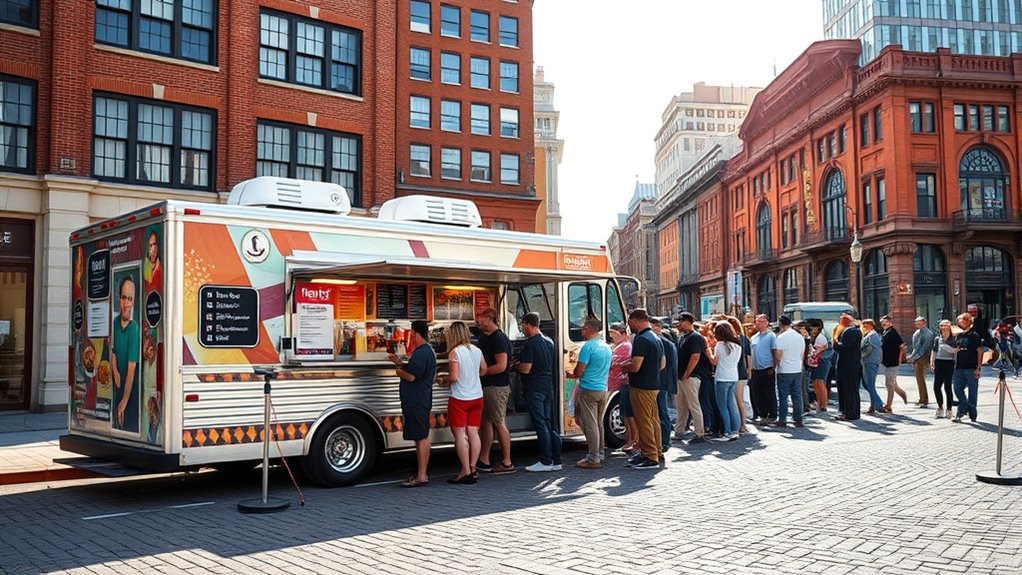
Choosing prime locations for your food truck is essential to attracting consistent crowds and maximizing sales. High foot traffic areas, like busy streets, parks, and event venues, boost visibility. Timing matters; target peak hours for better sales. Near transit hubs and downtown districts, you’ll find steady crowds of commuters and professionals. Food truck parks can attract regular visitors, but foot traffic varies. Use city data or personal observation to validate potential sites before committing. Incorporating expert analysis can help identify optimal spots based on current trends and data.
Crafting a Menu That Appeals to Boston’s Diners
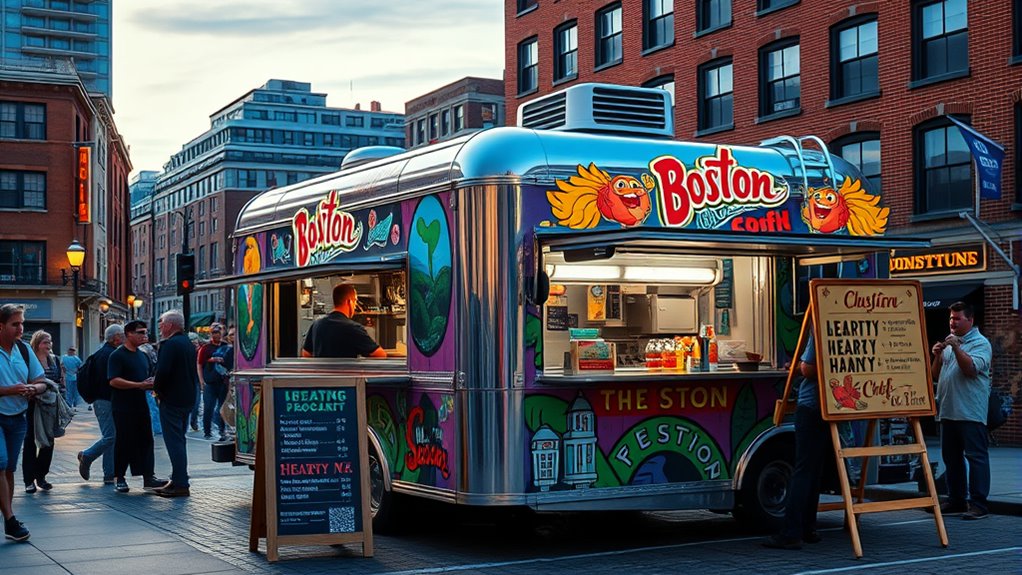
Crafting a menu that resonates with Boston’s diverse diners requires understanding local tastes and nightlife trends. Late-night trucks serve until 3 am, targeting night workers and nightlife crowds craving convenient, flavorful bites. Popular options include Caribbean fusion, tacos, and lobster rolls, reflecting Boston’s openness to bold flavors after hours. Incorporate regional staples like clam chowder to appeal to locals and tourists alike. Focus on quick, handheld foods ideal for crowded spots like Faneuil Hall or the Theater District. To deepen your menu’s appeal:
- Offer fusion dishes blending local and international flavors
- Include ethnic cuisines like Asian street food or Ethiopian dishes
- Provide vegetarian and vegan options for health-conscious diners
- Design portable, portion-controlled meal boxes for on-the-go eating
- Rotation schedules help ensure variety and freshness among nearly a dozen trucks participating, starting with 10 on a rotation basis, to ensure a variety of options and fresh offerings for customers.
This approach guarantees your menu appeals to Boston’s vibrant, diverse food scene.
Effective Marketing Strategies to Grow Your Food Truck Business
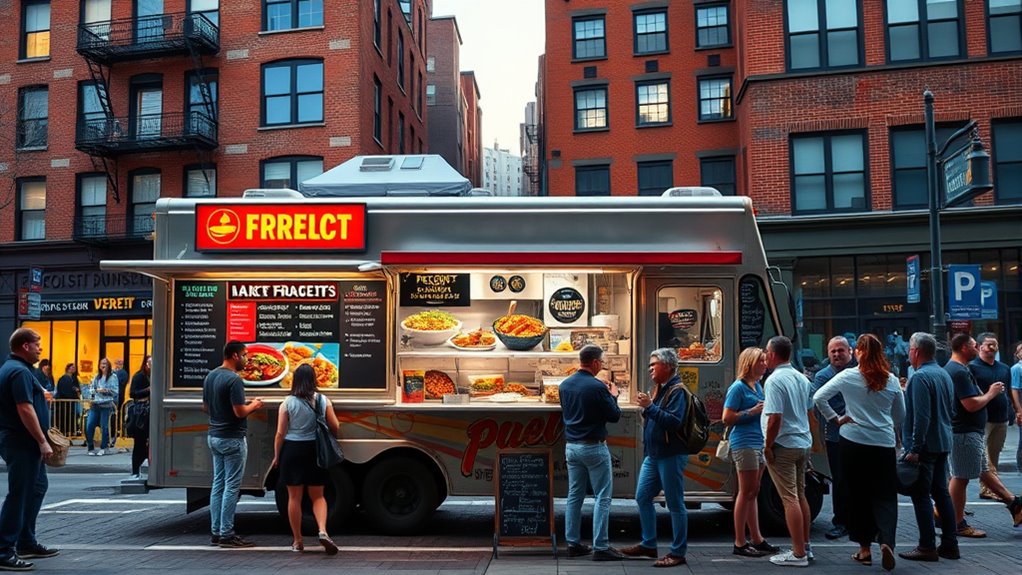
To stand out in Boston’s competitive food truck scene, effective marketing strategies are essential for attracting new customers and building loyalty. Leveraging social media is a top approach; 68% of food truck owners use platforms like Facebook, which boosts visibility and sales by around 20%. Active engagement encourages customers to spend 15% more on average and helps 40% discover trucks through ads. Participating in local festivals and events increases brand exposure, with 80% of trucks attending at least three yearly. These gatherings foster direct customer relationships and generate buzz. Additionally, using data analytics and mobile apps can improve targeting, leading to 25% higher ROI. Building email lists and loyalty programs also drive repeat visits, with over half of trucks seeing a 30% increase in customer retention. Incorporating targeted marketing strategies can further optimize outreach efforts and maximize growth potential. Over 24,000 food trucks operate across the United States, highlighting the industry’s significant scale and growth potential.
Tips for Ensuring Compliance and Long-Term Success
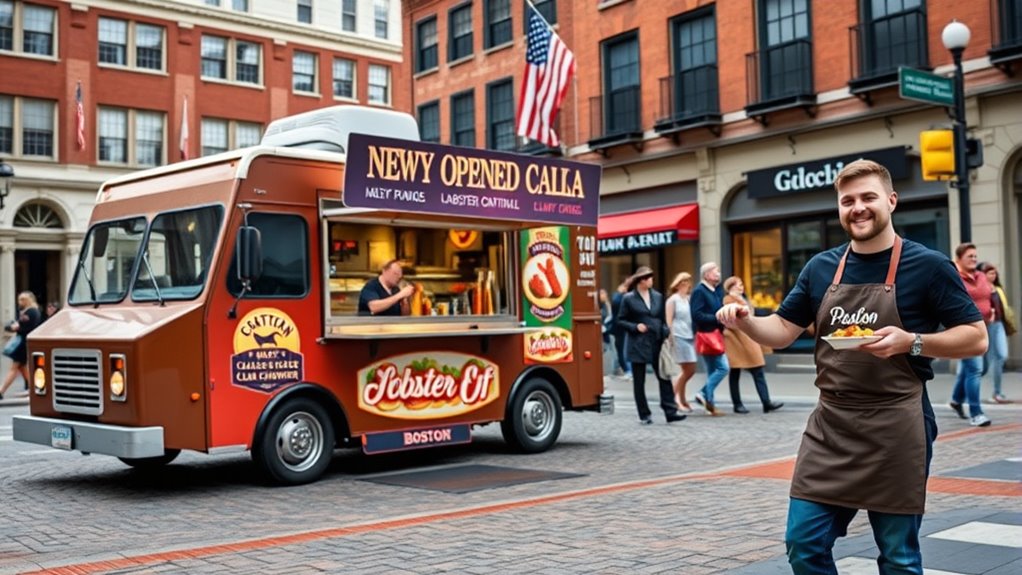
Ensuring compliance with Boston’s food truck regulations is crucial for avoiding costly penalties and maintaining smooth operations. Staying current with permits, inspections, and safety standards helps you avoid fines, impoundment, and operational disruptions. Regularly review city codes and ensure all paperwork, including your Boston Food Truck Permit, Health Permit, and transportation permits, are up to date. Keep detailed records of inspections, servicing logs, and staff certifications like your Certified Food Protection Manager. Conduct routine safety checks on your equipment and fire safety measures, including fire extinguisher readiness. To stay compliant, always operate within permitted hours and routes, and maintain proper spacing during events. Using a licensed commissary and adhering to sanitary and safety standards ensures your truck remains compliant and sets you up for long-term success. Understanding projector technology can also help you optimize your setup and presentation, especially if you plan to incorporate visual displays or digital signage.
Frequently Asked Questions
How Long Does the Permit Approval Process Typically Take in Boston?
The permit approval process in Boston usually takes about 4 to 6 weeks, but it can be faster if your permits are simple, around 2 to 3 weeks. You should be prepared for possible delays during peak seasons. To speed things up, make certain you submit complete documentation, including health, fire, and business permits, and follow all application steps carefully. Keep in mind, inspections and lottery scheduling can also influence your timeline.
Are There Any Grants or Financial Assistance Programs Available for Boston Food Trucks?
You’ll find several grants and financial assistance options for Boston food trucks. The Re-FRESH Program offers funding for local businesses, prioritizing neighborhoods with economic disparities. Massachusetts also provides grants through the Food Ventures Program and the Food Trust Program, supporting infrastructure, sourcing, and healthy food access. Additionally, the Food, Fuel, and Shelter Fund can aid with vehicle-related expenses. Applying to these programs can help offset costs and grow your food truck business.
What Insurance Coverage Is Mandatory for Operating a Food Truck in Boston?
You need to have mandatory insurance coverage to operate a food truck in Boston. This includes proof of liability insurance with at least $1 million coverage, often $2 million for venues. You also must have auto insurance to register your vehicle legally. If you hire employees, workers’ compensation is required. Additionally, you should consider property and umbrella policies to protect assets and extend liability limits, ensuring full compliance with Boston and Massachusetts regulations.
How Can I Find Available Designated Parking Spots for Food Trucks in Boston?
To find available designated parking spots for your food truck in Boston, start by visiting the Boston Public Works or Permitting Office at City Hall for official listings. Use platforms like FoodParks.io to discover private food park rentals and available spaces. Building relationships with local businesses and food truck associations can also lead to insider tips on permitted parking areas. Always verify regulations with municipal authorities before parking to guarantee compliance.
What Are the Most Effective Ways to Build a Loyal Customer Base in Boston?
To build a loyal customer base, focus on creating engaging digital marketing. Use personalized emails and social media updates to keep customers informed about your location, menu, and special offers. Implement a rewards program to incentivize repeat visits and participate in local events to foster community connections. Consistently deliver quality food and friendly service, and encourage customer feedback to strengthen relationships and turn patrons into loyal supporters.
Conclusion
Starting your food truck in Boston means steering permits, managing costs, choosing prime locations, crafting appealing menus, and implementing effective marketing. Embrace the challenges, innovate with passion, and stay committed to quality. With dedication, adaptability, and a clear vision, you can turn your food truck into a beloved local staple. Keep pushing forward, learn from every experience, and let your love for food and community drive your success. Your journey begins now—make it remarkable.
